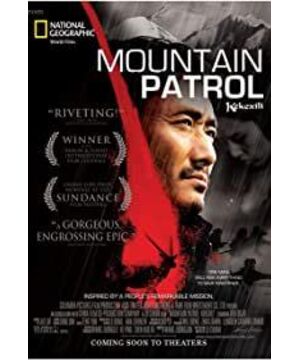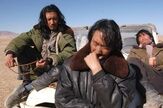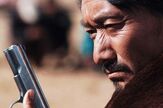Hoh Xil, beautiful land, beautiful Tibetan antelope, here is the hometown of Tibetans. In Hoh Xil, life is so fragile; but such a fragile life contains shocking beliefs, and for it, I would rather sacrifice my life.
Ma Zhanlin's appearance at the end doesn't feel credible. How could he walk out of Hoh Xil in the snow and join the hunter brigade before Ritai catches up with the hunter brigade?
There are the following types of people in the film:
1. The mountain patrol team members led by Japan and Thailand have no salary and no organization. They organized themselves and used their blood and even their lives to protect the Tibetan antelope and protect the pure land in the hearts of Tibetans.
Excerpt: "A group of heroes who can't even earn a few hundred yuan are working hard to protect the Tibetan antelope, but they themselves have not received the protection and support they deserve from the government; they either starved to death or were beaten to death by poachers. , or submerged in quicksand, they are not as easy as a Tibetan antelope, but they carry lofty ideals and heavy responsibilities and live a difficult life! Afterwards, 8 people who survived were prosecuted and sentenced by the government on the grounds that they Privately sold Tibetan antelope skins seized from poachers."
"Ritai is not a policeman, but a member of the voluntary mountain patrol team acting in the name of the Western Work Committee. He fined those caught fishing on the ice, Opening a note on the spot and taking the official seal out of his pocket and stamping it; he instructed the players to sell their skins; he chased the boss regardless of his or his own life; it all seems to make us question the justice and purity of the characters. , Ritai was single and his boss was beaten to death. It seems that Ritai's sacrifice sublimated his screen image, or a kind of preservation. In this way, what we see is an atypical hero, even a non-hero. He is A character who withers and collapses in the natural environment of desert flowers and in a difficult, powerless, and absurd social environment."
"The thickest and most plump character in the film is Liu Dong. As a mountain patrol member, he was called to and fro by the captain Ritai. Not only did he have no complaints, but at the same time, he also had a fierce self-instinctive pursuit of life, which was the most amazing. However, he bluntly reached out to his escort girlfriend to ask for money, and then turned around and used the flesh and blood money of the lowest-ranking women to rush to defend the noble mission of a group of volunteers. , so when Liu Dong turned around and frantically returned to the desert hinterland to rescue his comrades in arms, and was buried inch by inch in quicksand, we were deeply shocked by the humanistic temperature in the terrifying silence!"
"Poachers hunt and hide in order to survive. Antelope, and mountain patrol members also sell antelope skins to treat their teammates."
"A team member who has been camping in the wind and snow for three years symbolizes a commitment: for our own sheep!"
2. For 5 yuan Ma Zhanlin, a herdsman who went to peel a Tibetan antelope skin, was forced to live and was numb, but he also talked about human feelings.
"And the sigh of Ma Zhanlin, the accomplice of the Tibetan antelope hunters, unconsciously hit our natural ecology and also the entire human situation: "The grassland has turned into a desert, and the cattle and sheep have died! "So facing the helpless but innocent lives of Ma Zhanlin's family, they had no choice but to peel the flesh and fur of the Tibetan antelope with cruel knives for international fashion.
The mountain patrol team chasing Ma Zhanlin and his son fell to the ground due to pulmonary edema. It was Ma Zhanlin's son who saved him. In the end, Gayu was also the accomplice of the poacher.
The poachers hunted Tibetan antelope to survive, and the mountain rangers also sold antelope skins to treat their teammates.
There is no absolute in the world. The wicked will choose the good under certain circumstances, and Ma Zhanlin will also tell the surviving reporters at the end to follow the footprints of the sought-after people to walk to the road.”
3. Hunters, cruel and bloody, kill and hide for money Antelope, kill the patrol team members, unscrupulously.
====================================================================================================================================================================================
_
_ And Sheng: Existence, Morality and Belief Interpreted with Life
Here, every footprint you leave may be the first footprint left by human beings.
——Inscription
Scene 1: An eagle is flying, followed by a group of eagles, then Jamba's clean and naked back, the sky burial master waving a knife...
Scene 2: Ma Zhanlin stood beside Ritai's silent body for a long time, not far away It is his companion who is leaving, and in the distance is a silent mountain...
Scene 3: The sky, the silence is boundless, Liu Dong slowly sinks into quicksand, panic or calm, nothing can stop the ruthless sinking of life, the only thing that can be done is Could be watching the quicksand swallowing himself bit by bit. A person and his emotions and six desires, his good and evil, disappeared into the desert like this, without calling for help, without wailing.
It starts with the ceremony of sky burial and ends with the ceremony of sky burial. Whether it is an indictment of the constant reincarnation of life or a symbol of the endless cycle of life and death, it has locked the focus on the eternal theme of human death. This is an epic about faith, the swan song of a strong man on the Gobi Desert.
There is no praise, no irony, no criticism, no flogging, all that fills the whole film is the struggle in desperation, the struggle against nature, the struggle against poachers, and the struggle against oneself. Li Jingze said that Lu Chuan's film is a revolution in Chinese film aesthetics - prudent support, I feel that the most important part of the film is not necessarily a revolution in the sense of aesthetics, the important thing is that people feel the huge tension of life and existence .
"Bang", a life is over, the last request before death: "Put down the gun and follow me." The end of life can be so simple.
The girl in white, the burial master's knife, the circling condor, the lama chanting scriptures. All remembrance is just a reminder of the existence of life, remembrance is nothing, and existence itself has to be proved by nothing, because existence is always so easy to be ignored.
My heart aches when the struggling bodies and twitching limbs of the Tibetan antelopes are cruel and real, and when those blood-red skeletons, sheepskins and numb herdsmen peeling their skins for 5 yuan I was out of anger when it appeared! However, it is just anger, and the reality does not change because of the anger of a bystander!
paradox?
absurd?
Through the film, we see a group of tragic heroes and their absurd living conditions; we see the weakness and sadness of a group of idealists, and we want to cry without tears! A group of heroes who can't even earn a few hundred yuan are working hard to protect the Tibetan antelope, but they themselves have not received the protection and support they deserve from the government; they starved to death, were killed by poachers, or were killed by Submerged in quicksand, they are not as easy as a Tibetan antelope, but they bear lofty ideals and heavy responsibilities and live a difficult life! Afterwards, 8 of them who survived were prosecuted and sentenced by the government on the grounds that they privately sold Tibetan antelope hides seized from poachers.
Who is the real idealist in "Kekexili"? Is it Japan? He is a leader, a father, a resolute actor, his actions are clear, but
the sense of identity he brings to us is -- fuzzy, he is a mixture of hero and reality, in fact, the whole film is mixed with complexity Contradictory state of mind. It is a character who has exiled himself in an absurd situation, and has completely offset and alienated his position and meaning. He is not a policeman, just a member of a voluntary mountain ranger operating in the name of the Western Work Committee, he fines those caught fishing on the ice, opens a note on the spot and takes the official seal out of his pocket and stamps it; he instructs the team members Selling skins; his chasing after that boss regardless of the lives of his teammates and himself; it all seems to make us question the justice and purity of the characters. Then, the Japanese and Thai single encountered the boss and was beaten to death. It seems that Ritai's sacrifice is a sublimation of his screen image, or a kind of preservation. In this way, we see an atypical hero, even a non-hero. He is a character who withers and collapses in the natural environment of desert flowers and in a difficult, powerless and absurd social environment.
The thickest and most plump character in the film is Liu Dong. As a mountain patrol member, he was called around by the captain Ritai, and he not only had no complaints, but at the same time he also had a fierce self-instinctive pursuit of life, and the most amazing In one stroke, he reached out to his escort girlfriend for money without blushing, and then turned around and rushed to defend the noble mission of a group of volunteers with the flesh and blood of women at the bottom. That is, the foreshadowing of these few scenes in advance, so when Liu Dong turned around and frantically returned to the desert hinterland to rescue his comrades, and was buried inch by inch in quicksand, we were deeply shocked by the humanistic temperature in the terrifying silence!
In Hoh Xil, the simple and clear criteria we have used for many years to judge good and bad are completely invalid. Good and bad can change in an instant, just like life and death.
A team member's three years of camping in the wind and snow is a symbol of perseverance: for our own sheep! But the sigh of Ma Zhanlin, the accomplice of the Tibetan antelope hunters, unconsciously hit our natural ecology, including the entire human situation: "The grassland has become a desert, and the cattle and sheep have all died!" Ma Zhanlin's family, who also felt that their lives were innocent, had to peel off the flesh and fur of Tibetan antelopes for the sake of international fashion.
The mountain patrol team chasing Ma Zhanlin and his son fell to the ground due to pulmonary edema, but it was Ma Zhanlin's son who rescued him. In the end, saving Gayu was also the accomplice of the poacher.
Poachers hunt Tibetan antelope to survive, and mountain rangers also sell antelope skins to treat their teammates.
There
is no absolute good and evil in the world, the wicked will choose good in some cases, and Ma Zhanlin will also tell the surviving reporters at the end to follow the footsteps of the hottest people to reach the road.
With the abundance of material day by day, the world is filled with Chinese cars and fresh clothes and Yingge Yanyu. "The hands and faces of those who turn mountains are dirty, but their hearts are clean." People are used to measuring people by the nobility of their souls, and then they are used to laughing at them. How many people here can pat their chests and say that their hearts are cleaner than that Ma Zhanlin? ---- "5 yuan for a piece of leather!" Perhaps the distinction really lies in the presence or absence of the word "clothing".
In reality, "good" and "bad" cannot be distinguished, and more often than not, morality is subordinate to survival.
Director Lu Chuan said: "Kekexili is heaven, hell, or a holy place to witness life and faith!"
Hoh Xil means beautiful girl in Mongolian, which is probably the name of a lustful person, which is also an unknown name.
Beautiful girls are sad. They have been occupied by wealth and power since ancient times and turned into playthings or vases, and there are too many sins behind wealth and power, so beautiful girls have coexisted with sins since ancient times. ;When morality and law lose their binding force, beautiful girls will be humiliated by ordinary men like you and me, killed and drowned by the jealous eyes of old women and ugly women. This kind of story is in "Dog Town" by Lars . Von Trier showed it nakedly with a magnifying glass; even the beautiful young woman in "The Beautiful Legend of Sicily" was equally unlucky. In short, the fate of beautiful girls is often miserable, which also confirms the old saying that "beauty has a bad life since ancient times".
Therefore, when a place is named after a "beautiful girl", it must be dangerous, a place destined to be shrouded in desire, sin, and death! For Hoh Xil, I would rather translate him as "beautiful Tibetan antelope", because it has been a paradise for Tibetan antelopes for tens of thousands of years; and now the homeland of this beautiful Tibetan antelope has been trampled on by humans, and they have also been brutally ravaged by humans.
So why do human beings ravage this beautiful land, and why do they kill these Tibetan antelopes? Because some women want to dress up with wool to be more beautiful, some people hunt Tibetan antelopes to satisfy their desire for money, and some people just to survive!
Hoh Xil, life and death, good and evil, violence, blood. It doesn't belong to humans, and it doesn't belong to women. The phrase "there are many good girls" is so ridiculous, but it makes me unable to laugh. In Hoh Xil, they struggled with the most determined perseverance in the restricted area of life, only accompanied by faith, and survived with an unimaginable will. Facing the muzzle, Ritai could still throw his last punch, and then, with the sound of a "bang", he fell to the ground, twitching, and another bullet, no more twitching. Qiangba is gone; Liu Dong is gone; even the strong Lausanne will struggle in the snow and cry and say, "We can't get out", the team members disappear one by one, and finally the leader of Japan and Thailand is also lying there. on the land.
We think, then we understand, and then we suddenly realize: the world is not only full of traffic, not everyone can drink coffee so comfortably. The spirit is exhausted day by day, in an age of lack of faith, in a secular society that is mercenary everywhere, where can we find spiritual fullness.
We know very little about life, about faith, and always have.
But now, I can finally say something: "The image of Guevara printed on the shirt is outdated!"
A little African refugee murmured "there will be bread" before dying. As listeners, should we sing an elegy or pray - Right now, you say!
View more about Mountain Patrol reviews










